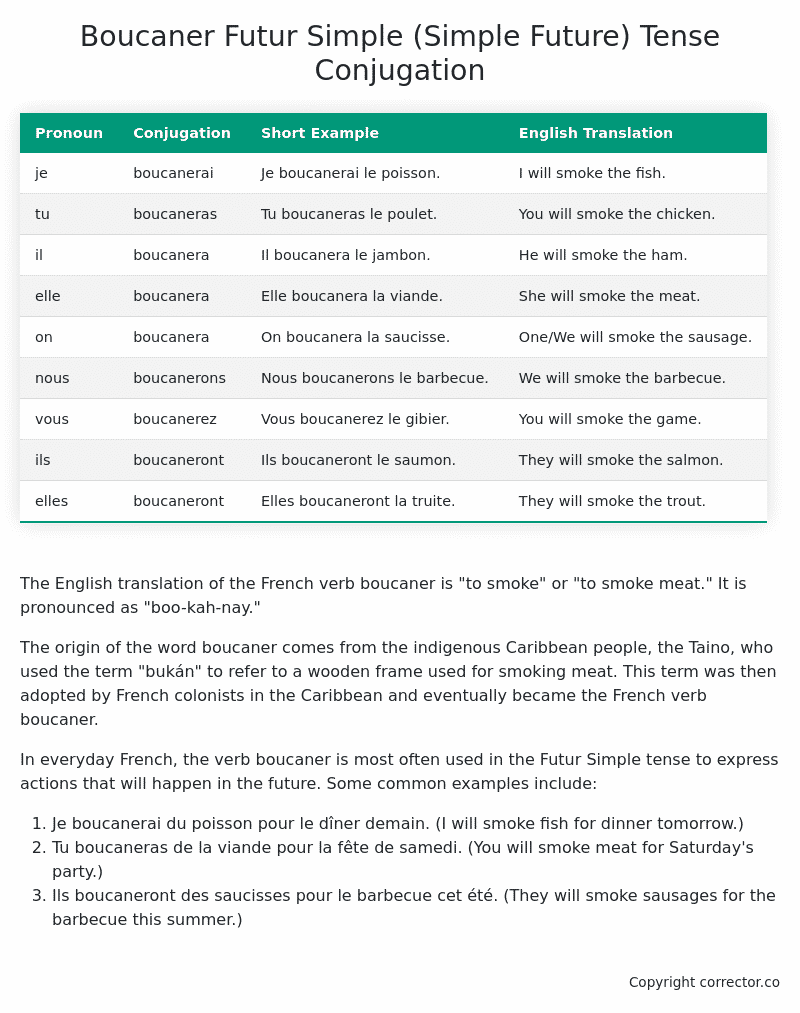Futur Simple (Simple Future) Tense Conjugation of the French Verb boucaner
Introduction to the verb boucaner
The English translation of the French verb boucaner is “to smoke” or “to smoke meat.” It is pronounced as “boo-kah-nay.”
The origin of the word boucaner comes from the indigenous Caribbean people, the Taino, who used the term “bukán” to refer to a wooden frame used for smoking meat. This term was then adopted by French colonists in the Caribbean and eventually became the French verb boucaner.
In everyday French, the verb boucaner is most often used in the Futur Simple tense to express actions that will happen in the future. Some common examples include:
- Je boucanerai du poisson pour le dîner demain. (I will smoke fish for dinner tomorrow.)
- Tu boucaneras de la viande pour la fête de samedi. (You will smoke meat for Saturday’s party.)
- Ils boucaneront des saucisses pour le barbecue cet été. (They will smoke sausages for the barbecue this summer.)
Table of the Futur Simple (Simple Future) Tense Conjugation of boucaner
| Pronoun | Conjugation | Short Example | English Translation |
|---|---|---|---|
| je | boucanerai | Je boucanerai le poisson. | I will smoke the fish. |
| tu | boucaneras | Tu boucaneras le poulet. | You will smoke the chicken. |
| il | boucanera | Il boucanera le jambon. | He will smoke the ham. |
| elle | boucanera | Elle boucanera la viande. | She will smoke the meat. |
| on | boucanera | On boucanera la saucisse. | One/We will smoke the sausage. |
| nous | boucanerons | Nous boucanerons le barbecue. | We will smoke the barbecue. |
| vous | boucanerez | Vous boucanerez le gibier. | You will smoke the game. |
| ils | boucaneront | Ils boucaneront le saumon. | They will smoke the salmon. |
| elles | boucaneront | Elles boucaneront la truite. | They will smoke the trout. |
Other Conjugations for Boucaner.
Le Present (Present Tense) Conjugation of the French Verb boucaner
Imparfait (Imperfect) Tense Conjugation of the French Verb boucaner
Passé Simple (Simple Past) Tense Conjugation of the French Verb boucaner
Passé Composé (Present Perfect) Tense Conjugation of the French Verb boucaner
Futur Simple (Simple Future) Tense Conjugation of the French Verb boucaner (this article)
Futur Proche (Near Future) Tense Conjugation of the French Verb boucaner
Plus-que-parfait (Pluperfect) Tense Conjugation of the French Verb boucaner
Passé Antérieur (Past Anterior) Tense Conjugation of the French Verb boucaner
Futur Antérieur (Future Anterior) Tense Conjugation of the French Verb boucaner
Subjonctif Présent (Subjunctive Present) Tense Conjugation of the French Verb boucaner
Subjonctif Passé (Subjunctive Past) Tense Conjugation of the French Verb boucaner
Subjonctif Imparfait (Subjunctive Imperfect) Tense Conjugation of the French Verb boucaner
Subjonctif Plus-que-parfait (Subjunctive Pluperfect) Tense Conjugation of the French Verb boucaner
Conditionnel Présent (Conditional Present) Tense Conjugation of the French Verb boucaner
Conditionnel Passé (Conditional Past) Tense Conjugation of the French Verb boucaner
L’impératif Présent (Imperative Present) Tense Conjugation of the French Verb boucaner
L’infinitif Présent (Infinitive Present) Tense Conjugation of the French Verb boucaner
Struggling with French verbs or the language in general? Why not use our free French Grammar Checker – no registration required!
Get a FREE Download Study Sheet of this Conjugation 🔥
Simply right click the image below, click “save image” and get your free reference for the boucaner Futur Simple tense conjugation!

Boucaner – About the French Futur Simple (Simple Future) Tense
Formation of Futur Simple
For regular -er verbs (e.g., parler – to speak)
For regular -ir verbs (e.g., finir – to finish)
For regular -re verbs (e.g., vendre – to sell)
Common Everyday Usage Patterns
Conditional Statements
Interactions with Other Tenses
Futur Antérieur
Conditional
Present
Summary
I hope you enjoyed this article on the verb boucaner. Still in a learning mood? Check out another TOTALLY random French verb conjugation!


